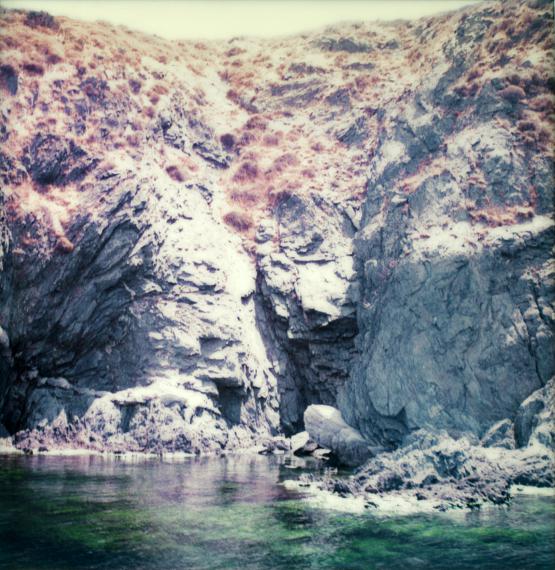
Sonnenfinsternis, Marmara-Meer, 2000
Polaroid SX-70
© Knut Wolfgang Maron
Knut Wolfgang Maron »
Picturing landscape / Bilder über Landschaften
SX-70 Polaroids 1978–2021
Exhibition: 18 Sep – 23 Dec 2021
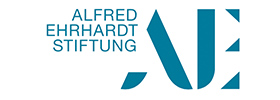
Alfred Ehrhardt Stiftung
Auguststr. 75
10117 Berlin
+49 (0)30-20095333
info@aestiftung.de
www.aestiftung.de
Tue-Sun 11-18
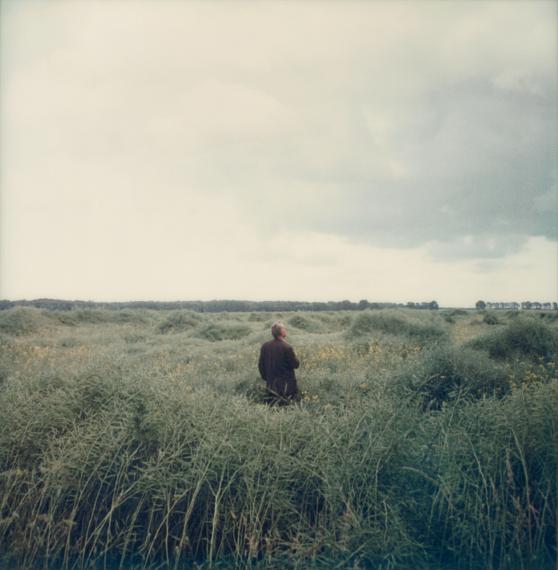
Mann im Rapsfeld, Mecklenburg-Vorpommern, 1997
Polaroid SX-70
© Knut Wolfgang Maron
Knut Wolfgang Maron
"Picturing landscape. SX-70 Polaroids 1978–2021"
Exhibition: September 18 – December 23, 2021
Opening: Friday, September 17, 2021, 6 – 9pm
Knut Wolfgang Maron counts as one of the pioneers of modern color photography and
Polaroid photography in particular. For his solo exhibition at the Alfred Ehrhardt Stiftung,
he has selected several hundred images from a total body of work comprising over 8,500
Polaroids.
The inherently political dimension of Knut Wolfgang Maron’s imagery becomes
apparent against the backdrop of climate change. Ecological issues have had an influence
on Maron’s view of nature as far back as the 1986 Chernobyl nuclear disaster: "Landscape
photography with a Polaroid camera was considered an avant-garde quirk at the time. I
was interested in using a contemporary medium to express the dialectic of a brave New
World and the changing environmental conditions, especially after Chernobyl’s realworld
and psychological impacts. Over the past forty years, the overall consciousness has
changed considerably. Once again, a younger generation of photographers is paying
attention to landscape, nature, and climate change."
In 1978, when artistic color photography was first making its way into art museums in
Germany, Maron was an outlier. Almost all photographers at that time focused on street
photography and urban landscapes; he had no interest in being part of this American
tradition. The Folkwangschule in Essen, where he studied under Otto Steinert and Erich
vom Endt, was the first German university with a color photo lab. Unlike his fellow
students, however, the trained photographer had already mastered the color process to
perfection. Finishing his studies at this school was therefore no longer an imperative and
by the time the Polaroid SX-70 camera came onto the market, he had made his decision
to work with exactly this "imperfect," difficult-to-control technology. Different from his
contemporaries, he was not interested in the objective reality of reportage or
documentary photography, but in a visual language that, in line with Otto Steinert’s
"Subjective Photography," calls for the viewer’s own subjective interpretation. Maron
was a rebel of observation. His use of Polaroid photography deliberately ran counter to
the zeitgeist. At that time, it was an unimaginable breach of taboo and a tremendous
provocation against all art parameters.
Even today, this analog medium exerts a powerful appeal, especially with a younger
generation that has grown up with digital production methods. Instant image generation
not only makes Polaroids alluring but their fusing of surface areas and unconventional
color tones are also highly seductive. The serenity of the square demands exacting
compositional strategies, and the distance from the subject yields unexpected and
surprising results.
Maron’s range of colors transports us to another world: seemingly immersed in an alien
light, shrubs and trees are reduced to white silhouettes. Skies glow yellow, karstic rock
formations oscillate into blue, ground surfaces turn purple, and the sea drowns in
turquoise. Nature appears to be illuminated from within and is transformed into a
reflection of a realm poised between dream and memory. Warm tones, but also focused,
tranquil compositions attest to Maron’s deftness with the pictorial ideas of romanticism,
conveying a restrained grandeur.
A catalog will be published by Verlag Kettler.
Accompanying events:
Sunday, September 19, 2021, 2pm:
Guided tour through the exhibition with the artist and Dr. Christiane Stahl, director of the Alfred Ehrhardt Stiftung
Sunday, October 10, 2021, 2pm:
Artist talk with Thomas Seelig, director of the photography collection, Museum Folkwang Essen
Thursday, November 18, 6pm:
Guided tour through the exhibition with the artist and Dr. Christiane Stahl, director of the Alfred Ehrhardt Stiftung
All events are by reservation, in accordance with official requirements.
Please register in advance at:
info@aestiftung.de.
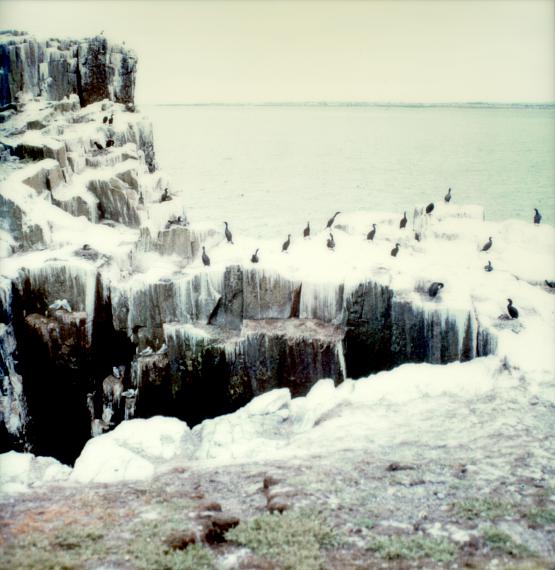
Farne Island, 2000
Polaroid SX-70
© Knut Wolfgang Maron
Knut Wolfgang Maron
"Bilder über Landschaften. SX-70 Polaroids 1978-2021"
Ausstellung: 18. September bis 23. Dezember 2021
Eröffnung: Freitag, 17. September, 18 - 21 Uhr
Knut Wolfgang Maron zählt zu den Pionieren der modernen Farbfotografie, insbesondere der Polaroidfotografie. Für seine Einzelausstellung in der Alfred Ehrhardt Stiftung hat er aus seinem mehr als 8.500 Polaroids umfassenden Gesamtwerk mehrere Hundert Arbeiten ausgewählt.
Die politische Dimension, die Knut Wolfgang Marons Bildern innewohnt, wird vor dem Hintergrund des Klimawandels deutlich. Spätestens seit der Atomkatastrophe von Tschernobyl 1986 prägten ökologische Fragen Marons Blick auf die Natur: "Landschaftsfotografie mit der Polaroidkamera galt damals als schräge Avantgarde. Mir lag daran, die Dialektik einer schönen Neuen Welt und der veränderten
Umweltbedingungen, besonders nach Tschernobyl mit seinen realen und mentalen Auswirkungen, in einem zeitgemäßen Medium auszudrücken. In den letzten 40 Jahren hat sich das allgemeine Bewusstsein erheblich verändert. Landschaft, Natur und Klimawandel finden vor allem bei der jüngeren Generation von Fotografen wieder große Beachtung."
1978, als die künstlerische Farbfotografie in Deutschland gerade erst Einzug in die Kunstmuseen erhielt, war Maron solitär in seiner Auffassung. Fast alle Fotografen beschäftigten sich damals mit Street-Photography und Stadt-Landschaften, und in diese amerikanische Tradition wollte er sich nicht einreihen. Die Folkwangschule Essen, wo er bei Otto Steinert und Erich vom Endt studierte, besaß als erste deutsche Hochschule ein Farbfotolabor. Jedoch beherrschte der gelernte Fotograf anders als seine Studienkollegen die Farbverfahren bereits bis zur Perfektion. Durch diese Schule musste er also nicht mehr gehen, und als die Polaroidkamera SX-70 auf den Markt kam, entschied er sich gerade für diese "unperfekte", schwer kontrollierbare Technik. Denn ihn interessierte nicht wie seine Zeitgenossen die objektive Wirklichkeit der Reportageoder Dokumentationsfotografie, sondern eine Bildsprache, die, Otto Steinerts "Subjektiver Fotografie" folgend, eine subjektive Interpretation des Betrachters erfordert. Maron war ein Rebell des Blicks. Mit der Polaroidfotografie bürstete er bewusst gegen den Zeitgeist. Damals war das ein unvorstellbarer Tabubruch und eine ungeheure Provokation gegen sämtliche Kunstparameter.
Bis heute übt dieses analoge Medium gerade für die jüngere, mit digitalen Produktionsweisen aufgewachsene Generation einen großen Reiz aus. Polaroids bestechen nicht nur durch ihre sofortige Bildproduktion, sondern verführen auch durch ihren spezifischen Oberflächenschmelz und ihre unkonventionelle Farbtönung. Die Ruhe des Quadrats erfordert präzise Kompositionsstrategien, und die Distanz zum Gegenstand bringt Unerwartetes und Überraschendes mit sich.
Marons Farbskala versetzt uns in eine andere Welt: wie in außerirdisches Licht getaucht, werden Sträucher und Bäume zur weißen Silhouette reduziert. Die Himmel erglühen gelb, die karstigen Felsen changieren ins Blau, die Böden werden lila und das Meer ertrinkt im Türkis. Die Natur wirkt wie von innen heraus erleuchtet und wird zum Spiegelbild eines Raums zwischen Traum und Erinnerung. Die warmen Tönungen, aber auch die konzentrierten, ruhigen Kompositionen zeugen von Marons Umgang mit
Bildideen der Romantik, die eine zurückhaltende Erhabenheit transportieren.
Es erscheint ein Katalog im Verlag Kettler.
Begleitende Veranstaltungen:
Sonntag, 19. September 2021, 14 Uhr:
Führung durch die Ausstellung mit dem Künstler und Dr. Christiane Stahl, Direktorin Alfred Ehrhardt Stiftung
Sonntag, 10. Oktober 2021, 14 Uhr:
Künstlergespräch mit Thomas Seelig, Leiter Fotografische Sammlung Museum Folkwang Essen
Donnerstag, 18. November, 18 Uhr:
Führung durch die Ausstellung mit dem Künstler und Dr. Christiane Stahl, Direktorin Alfred Ehrhardt Stiftung
Die Veranstaltungen finden unter Vorbehalt statt, entsprechend der behördlichen Auflagen.
Um
Voranmeldung wird gebeten: info@aestiftung.de
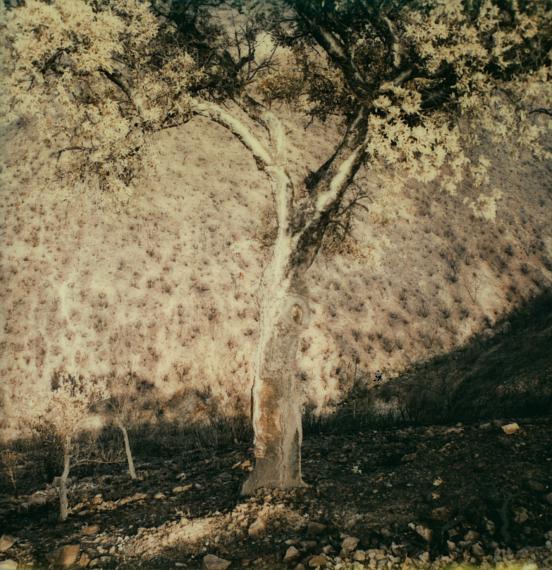
Cap d’Antibes, 1999
Polaroid SX-70
© Knut Wolfgang Maron
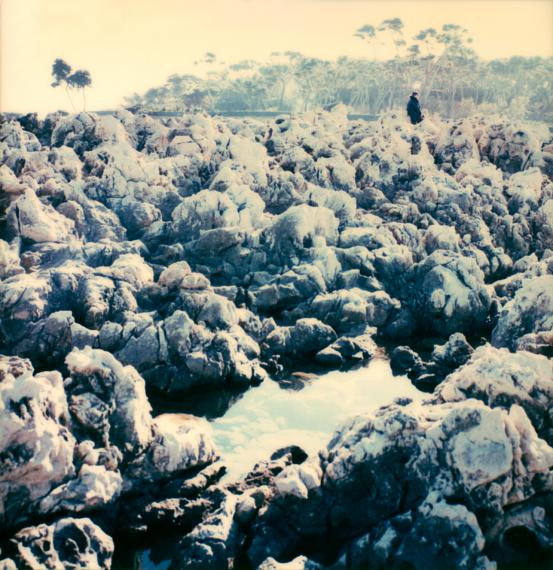
Esterel 1, 1988
Polaroid SX-70
© Knut Wolfgang Maron